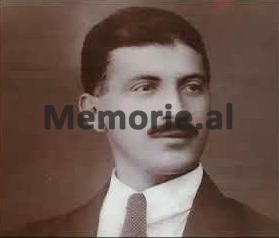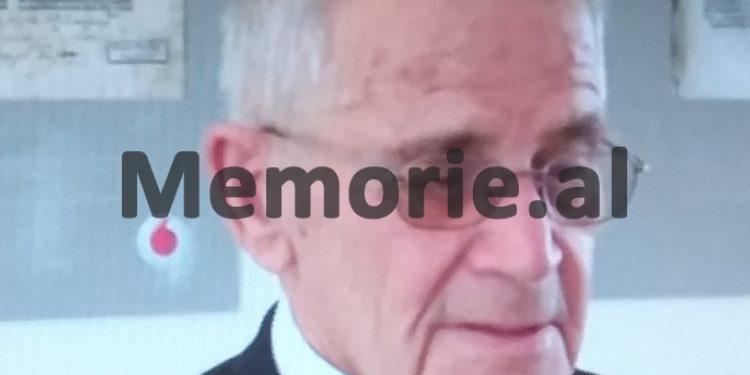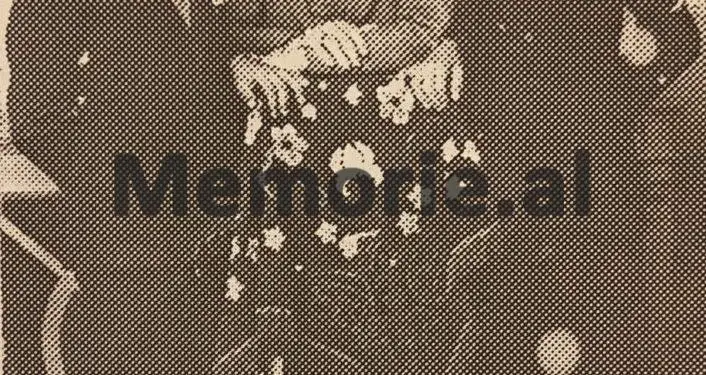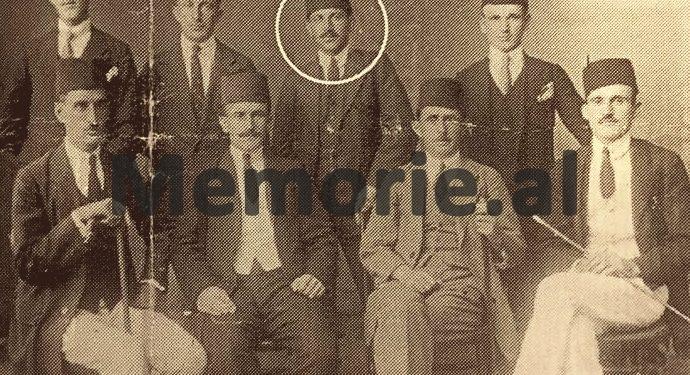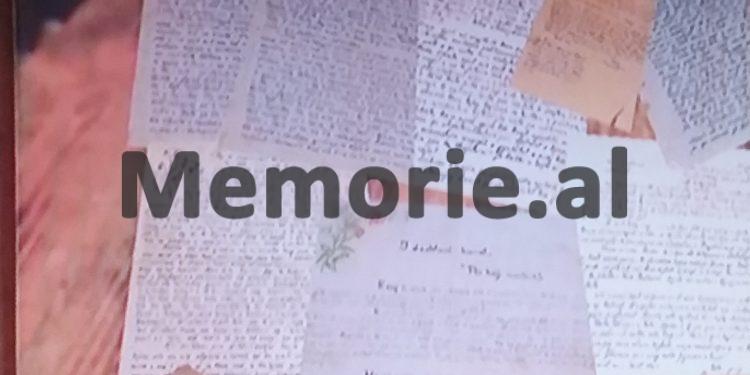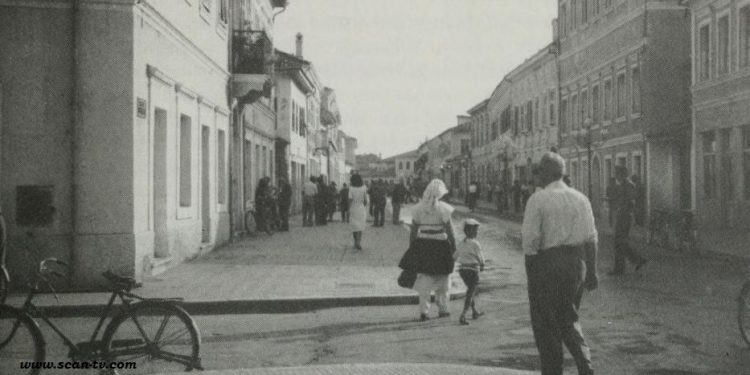Dashnor Kaloçi
Memorie.al publishes the unknown story of Sheqet Muka from the city of Shkodra, who since 1910 dealt with the spread of Albanian education in the city of Shkodra and was one of the founders of the Society “Vllaznia”. The Parruca School that Shefqeti opened and where he served for almost 20 years, became one of the best schools not only in that city but also beyond. After that, Shefqeti made every effort to open the Albanian gymnasium in the city of Shkodra and for that he asked for help and support from some of the famous figures and personalities of that time, such as: Rexhep Mitrovica, Mustafa Kruja, Maliq Bushati, Mithat Frashëri, Halit Rojit, Kristo Floqi, Sali Vuciterni, Rexhep Mitrovica, etc., sending letters, where among other things he wrote: “To equip the sons of Albanian with the wings of knowledge, which are the most valuable ornaments of this life”
The arrest of Shefqet in 1919 in the city of Vlora together with Hys Draçini, Ymer Ruzhdina and Halil Berisha by the Italian authorities, he returned to his city of Shkodra, but in 1924, he was suddenly arrested again by the government of Fan Noli, accusing him of supporting the former Minister of Internal Affairs, Ahmet Zogu, who had left Albania.
The activity of Shefqet Muka during the years of the Zog Monarchy where he worked as a teacher in the city of Shkodra and in 1933 he transferred to Tirana as director of the School “Hoxha Tasim”, where after working for four years, he was called to lead the Vorfnore Shelter and after three years in that position, at the suggestion of Jakomon’s wife, he was fired and then arrested and served some time in prison in Elbasan and Tirana. Shefqet’s involvement in the Antifascist Movement during the period of occupation, 1939-1944, joining the nationalist forces of Legality.
The escape of Shefqet Muka in November 1944 going to the mountains to escape the revenge of the communist forces and his surrender after two years, initially sentenced him to life imprisonment and then to 25 years, which he suffered in the terrible prison of Burrel from where he was released only in 1965 at the age of 78 and after a year he passed away in his home in the city of Shkodra.
“After the war ended in November 1944, for almost two years my father hid in the mountains knowing that the revenge of the communists and the persecution of him would not be lacking. This was confirmed by the internment that the communists inflicted on our family in Berat. In the autumn of 1946, the communist government of Enver Hoxha granted an amnesty to political fugitives, from which the father also benefited. Based on this, on October 21 of that year, he surrendered himself, which was triumphantly published in the newspaper “Bashkimi”. After an eight-month ordeal under investigation, he appeared in court along with Xhemal Naip, Shaqir Omar, Nexhat Boric, Bep Negri and Ismail Elez. The military tribunal, with a prosecutor, Captain Namik Qemali, ruled: Defendant Shefqet Muka is sentenced to life imprisonment. ” Albanians in the city of Shkodra, who after the end of the War, accused of being a friend and supporter of Ahmet Zogu and Abaz Kupi, as well as members of several anti-communist organizations, such as: “Besa Shqiptare” and “Beslidhja e Shkodrës”, was sentenced to 25 years in prison, which he suffered in the horrific Burrell prison, from where he came out in September 1965 at the age of 78.
Who was Shefqet Muka?
Shefqet Muka was born on September 13, 1887 in the city of Shkodra, in one of the famous families of that city. Shefqet graduated with honors from the city’s Turkish gymnasium (military school) in 1910, but seeing the great need for teachers at the time. He took the initiative and with many efforts managed to open the first primary school of the city in the neighborhood “Parrucë” which became one of the best schools, not only in Shkodra, but also beyond. The director of this school was Abaz Golemi, but the organization, direction and encouragement to further the educational activity of that school, belonged to Shefqet Muka. This is made known by an assessment given at that time by the inspector of education in the city of Shkodra, Gaspër Mikeli, who wrote, among other things: “Shefqet Muka, although there is no normal course or studies, with lively practice and with the experience of 14 years he has as a teacher, and with the studies and singing that he does day by day, he has equipped the world with knowledge and with the qualities that are required to have a real teacher. shows in the performance of the task and the ability that especially excels in the development of the lesson, prove that this is no different from the capable normal teachers of Shkodra “. Shefqeti did not leave his education only with the Turkish gymnasium that he finished in 1910, but for his pedagogical training he was constantly taken care of and around 1915, he completed a qualification course for French and Albanian language in the Commercial School. Italian that was operating at that time in the city of Shkodra. In addition, he collected books, newspapers, magazines and encyclopedic dictionaries in his house, having a very rich library for the time, with pedagogical, philosophical, scientific and religious literature in several languages of the world, mainly Arabic, Persian, Turkish, French and Italian.
Efforts to open a gymnasium in Shkodra
Shefqeti with his work and passion for the spread of Albanian education in the city of Shkodra, soon gained a great name and enjoyed great respect among colleagues, students and the population of his hometown. So, at that time he got in touch and kept in regular correspondence with a number of personalities of that time from different fields, such as education, science, culture and politics, both inside and outside the country, asking for their help even in the city of Shkodra to open an Albanian gymnasium. This became more acute in 1920-’22, when Shefqeti made every effort to open a state gymnasium in Shkodra. In this context, he wrote a series of requests and petitions which he sent to the high personalities of that time, such as: Rexhep Mitrovica, Mustafa Kruja, Maliq Bushati, Mithat Frashëri, Halit Roji, etc. Among other things in those petitions he wrote: “I will equip the sons of Albanian with the wings of knowledge, which are the most valuable ornaments of this life”. He demanded equal education for both boys and girls, as well as compulsory education for all children and their qualifications and preparations abroad in the most advanced schools in Europe. In 1921, in a letter to Kristo Floqi, the Minister of Education, Shefqeti, among other things, severely criticized him, because of the contingent of boys and girls who were sent abroad, there was none from Shkodra. In that letter, among other things, he wrote: “I was leaving it because there were no Muslim cemeteries in our city to send them to foreign schools, but no boys were found either. I am reminded that the Minister of Education, is not that Kristo Floqi that we introduced here in Shkodra, with free ideas, but another “?! But even after that, Shefqeti continued his efforts to strengthen education in state schools and was against the closure that took place then in some schools in Shkodra and the opening of private ones, and for this he wrote a letter of protest to Sali Vucitern, where he opposed the proposal of the Minister of Education, Rexhep Mitrovica, for the closure of some schools and the qualification of teachers. The school of Parruca, where Shefqeti served as a teacher and director for 20 years, became one of the best schools, not only in the city of Shkodra, but also nationwide. In 1918, the Consul Kral, Mati Logoreci and Luigj Gurakuqi visited his class, who highly appreciated his work.
Imprisoned in Italy
Shefqeti was an example of religious understanding in the city of Shkodra, which at that time by special regressive elements was likely to disrupt. In that regard, he worked closely with Catholic clergy, such as Father Gjergj Fishta and Anton and Mark Harapi, who had helped him in his efforts to open the Shkodra State Gymnasium. He was also one of the founders of the patriotic, cultural and sports society “Vllaznia”, which was formed on March 10, 1910, in that city. This society where Shefqeti was one of the most active members who made a great contribution, aimed at the cultural uplift of the youth of Shkodra through various literary, musical, theatrical and sports activities, as well as the opening of night schools for learning the Albanian language. Towards the end of 1919, when Shefqeti was in the city of Vlora, as a result of his anti-Italian political activity, together with Hys Draçini, Ymer Ruzhdina and Halil Berisha, he was arrested by the Italian authorities who still kept Vlora occupied. The arrest of Shefqet on November 19, 1919, came as a result of his patriotic activity, which conflicted with the interests of the Italians. Shefqet was held captive in the city jail until January 24, 1920, after which he was handcuffed and taken to Favijano, Sicily. Considering him a very dangerous person, Shefqet was kept in prison and interned. He protested his arrest and imprisonment by writing letters to both Italian Foreign Minister Baroni Alioti and Prime Minister Giolitti. After 14 months in prison, he was released and returned to Albania on 20. IX. 1920, where he immediately resumed his activity for the spread of Albanian schools in that city and its surroundings.
Imprisoned by Noli and Jakomoni
After arriving in Albania, Shefqet Muka unreservedly supported the Congress of Lushnja and wrote about this: “Our people told the world back that there was no time to die and the dinner of foreigners was held”. He then praised and supported the Vlora War, and in the letter, he sent to the volunteers who took part in that war, he wrote, among other things: “Your patriotic courage increased the fame of Albanians among the circles of the civilized world and Albania.” The surprises in the life of Shefqet Muka, was his arrest by the government of Fan Noli that came into force with the “June Revolution” of 1924. With a proposal of the Ministry of Education and decision of the Government headed by Fan Noli. On July 22, 1924, he was fired and imprisoned, along with Shefqet, the director of the Parruca School, Abaz Golemi, and the director of the Little Russia school, Rustem Lopçi, were fired. Their work and imprisonment came because they were known as outspoken supporters of former Interior Minister Ahmet Zogu, and she indignantly outraged many Shkodra patriots and local authorities, who demanded their return to work, in a petition sent to the Ministry of Education. and Prime Minister it Fan Noli, among others wrote: “They are among the oldest, most talented and most energetic teachers and are known as the founders of the National education of this Region. Therefore, with their departure, a great damage is done to our country and national education. “After that, the state authorities of Noli’s government were forced to annul the decision taken and release Shefqet Muka from prison. During the years of the Monarchy, Shefqet worked as teacher and school director in the city of Shkodra and in 1933 he came to Tirana with transfer as director of the school “Hoxha Tasim”. After three years in this school, he was called to take over as Director of the Vorfnore Shelter in Tirana. He worked in this institution for about three years until 1939, when after a proposal of Jakomon’s wife, he was fired on June 5 of that year and was arrested as an anti-fascist and sent for four months to Elbasan from where he was brought in Tirana prison.
Exponent of Legality
After his release from prison, Shefqeti returned to Shkodra and until November 1944, he took an active part in the Anti-Fascist Movement as an exponent of the Legality Movement (being a participant in the Congress that took place in Zall-Herr), which was then run. by Abaz Kupi. He was one of the founders of the organization “Besa Shqiptare” together with the nationalists Ndoc Çoba, Tef Gera, Kol Kiri, Hysen Lohja, Hys Draçini and Xhemal Naipi, whose meeting took place at the house of Ndoc Çoba. The purpose of that meeting was to unite all political forces, in order to avoid fratricide and to reconcile bloodshed. In March 1944, in order to avoid the fratricidal war, in the house of Gjon Marka Gjoni in Shkodra, another meeting was held where the organizations “Besa Shqiptare”, “Grupi Indipendent Nacional” and “Balli Kombëtar” participated, where Shefqeti together with Ndoc Çoba, were the representatives of the organization “Besa Shqiptare”, while the other two organizations were represented by Hafiz Ali Tari, Mark Gjonmarkaj, Lec Kurti and Jup Kazazi. In this meeting was created “Beslidhja e Shkodrës” which carried out its activity until November 1944, when the main leaders of the nationalist organizations of Legality and the National Front, such as: Abaz Kupi, Mit’hat Frashëri, Hasan Dosti, Faik Quku, Sali Myftia, etc., were forced to leave Albania. Also, as an exponent of Legality, during 1944 Shefqeti participated in all the meetings held by the nationalist party of Shkodra, such as that of the cinema “Rozafat” in May of that year, where it was called to avoid the fratricidal war and to to withstand the attacks of Enver Hoxha’s partisan forces.
20 years in Burrell Prison
After the end of the war, seeing the great revenge that the communists undertook against all their opponents whom they described as “traitors and enemies of the people”, Shefqet Muka for two years remained hidden in the mountains. At the time Shefqeti was on the run, his family was interned in Berat. In October 1946, when the communist government granted an amnesty to the fugitives, he surrendered himself, which was widely reported in the newspaper “Bashkimi”. After an eight-month ordeal under investigation, he appeared in court along with Xhemal Naip, Shaqir Omar, Nexhat Boric, Bep Negri and Ismail Elez. Shkodra Military Court with decision no.165. dt. 26.6.1947, sentenced him to life imprisonment, accusing him of being a loyal element of King Zog and organizer of the anti-communist organization “Beslidhja e Shkodrës”. In that trial, Shefqet Muka took a manly stance, addressing the court: “Gentlemen of power, I do not call my activity treason, because I did not commit treason to repent and be punished.” Besa Shqiptare “and” Beslidhja e Shkodrës ” “were not treacherous organizations.” Then the verdict of the court from life, reduces you to 25 years which Shefqeti suffered in the terrible prison of Burrel, making 20 years, after 5 years they were sentenced to an amnesty. From the hell of Burrel, Shefqet Muka came out at the age of 78, in September 1965 and after a year and a half, in January 1967 he passed away at his home in the city of Shkodra. Although at that time the situation and the class war were very tense and Shefqeti was declared an enemy, in his funeral that cold winter day, attended thousands of believers of different faiths, where there were clerics such as: Father Frano Kiri, Padre Mark Harapi, Hafiz Sabri Beg Bushati, Hafiz Halit Tari, Hafiz Xhevdet Zylja, etc./Memorie.al




